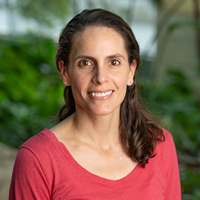
The Institute for Research on Poverty Welcomes Dr. Sarah Halpern-Meekin as New Director

Dr. Sarah Halpern-Meekin will assume leadership of the Institute for Research on Poverty (IRP) at the University of Wisconsin–Madison on August 19, 2024. She succeeds Dr. Katherine Magnuson, who has served as IRP Director since 2019, and who was previously IRP’s Associate Director of Research and Training.
Halpern-Meekin is the Vaughan Bascom Professor of Women, Family and Community in the Department of Human Development and Family Studies in the School of Human Ecology and a professor in the La Follette School of Public Affairs at UW–Madison. A mixed methods sociologist, her current research includes longitudinally following how mothers who are low income when their child is born experience monthly unconditional cash gifts; understanding the lives of prime-age men who are out of the labor force (i.e., neither working nor seeking a formal job); and studying the role of relationship churning—on-again/off-again relationships—in the lives of parents and their children.
A long-time IRP affiliate and member of IRP’s executive committee, Halpern-Meekin’s other UW affiliations include the Department of Sociology, the Health Disparities Research Scholars (HDRS) Program, the Center for Demography and Ecology, and the Retirement & Disability Research Center.
“IRP plays an important role in helping to set the agenda for poverty research in the United States, and I want to carry forward IRP’s priorities in ensuring that a wide array of stakeholder voices is part of that research and policy conversation,” Halpern-Meekin said.
Outgoing Director Magnuson is confident that Halpern-Meekin will advance the mission of IRP. “I am very pleased to be leaving IRP in Sarah’s hands. She is a highly accomplished mixed methods and interdisciplinary scholar, who will provide excellent leadership at IRP in the upcoming years,” she said.
For her part, Halpern-Meekin appreciates Magnuson’s contributions and looks forward to building on them, saying, “Katherine has spearheaded a strong set of research activities, partnerships, and training and professional development programming over the past five years. I am looking forward to continuing this work and to expanding its reach.”
Highlights of Magnuson’s tenure include:
- spearheading the successful renewal of a five-year cooperative agreement with U.S. Department of Health and Human Services’ Office of the Assistant Secretary for Planning and Evaluation (ASPE). The agreement, worth more than $10 million, provides for a variety of research, training, and funding that supports a growing network of poverty and economic mobility scholars;
- expanding IRP’s role in placing early-career poverty and economic mobility scholars in federal offices as National Poverty Fellows and Economic Mobility Fellows;
- creating a biannual week-long National Research Center on Poverty and Economic Mobility Early-Career Mentoring Institute in partnership with the University of California, Davis’s Center for Poverty & Inequality Research; and
- furthering IRP’s mission to learn from scholars who examine and understand the particular challenges facing marginalized communities.
IRP is the National Research Center on Poverty and Economic Mobility as designated by the U.S. Department of Health and Human Services. It is a nonpartisan research institution dedicated to producing and disseminating rigorous evidence to inform policies and programs to combat poverty, inequality, and their effects in the United States. IRP functions as an independent, multidisciplinary center within the College of Letters and Science at the University of Wisconsin–Madison.